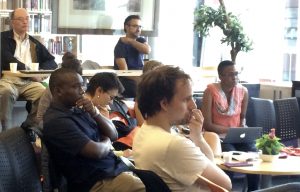Everything is ready for last year’s success to repeat itself: Once again, students from all over the world are coming for the Centre on Law and Social Transformation’s PhD course.
Last chance: APPLY HERE!
Read the detailed course description here.
The PhD course “Effects of Lawfare: Courts and law as battlegrounds for social change” will take place on 18-26 August, previous to and parallel with the international, annual seminar Bergen Exchanges (see the detailed program here).
– The rise of “rights revolutions” changed the balance of power and allowed many previously harmed minorities to harness the power of newly assertive courts to protect their rights, Bruce Wilson, professor at the University of Central Florida, explains. Together with Camila Gianella and Siri Gloppen, he is in charge of the PhD course.
Beneficial or backlash?
But this accelerating juridification in our societies; is it solely beneficial for marginalized groups or can it rather be an obstacle that depoliticize social struggles?
– It can often be a new tool for marginalized groups to protect their rights. Having said that, there is also evidence that courts might find it difficult to act to protect minority rights in certain cases. This has recently been seen in Costa Rica where the constitutional chamber of the Supreme Court was willing and able to rule in favour of many low key rights cases for LGBT (lesbian, gay, bisexual and trans) people, but the court stopped short on the big decision of same sex marriage due to a backlash from well-organized catholic and evangelical groups, Wilson explains.
This, and a lot more, are questions that will be discussed during the course. Experiences from last year show that there was no lack of topics to discuss or people to discuss with.
Leading scholars
The PhD course runs parallel to the conference Bergen Exchanges, which exposed the PhD students to some of the world’s leading law and society scholars.
– I think the course provide a unique experience because students will have the opportunity to attend to sessions with experts in the topic, to discuss their research ideas, and engage in discussions with scholars during the Bergen Exchanges, organizer Camila Gianella says.
Lara Cortes, one of last year’s participants with a PhD in law and currently a project researcher at the Centre on Law and Social Transformation, fully agrees.
– One of my motivations for applying was to get in touch with leading scholars in the same area of study that I belong to. I had a PhD from before, but the course really helped me to build an international network, Cortes says.

Network: Lara Cortes presented her research for fellow PhD course participants at last year’s course.
Bruce Wilson point at the interaction with last year’s Annual Lecture lecturer during the Bergen Exchanges, Gerald Rosenberg. Midways in the seminar week, Rosenberg held an outstanding lecture at the faculty of law at the University of Bergen, before Bergen Exchanges participants and PhD students attended a cocktail reception.
– Gerry Rosenberg was the archetype of a perfect academic guest: he gave an amazing keynote address that talked to the themes of the Exchanges and then stayed around for other presentations and to discuss projects with the PhD students, Wilson says.
Interdisciplinary
Kristine Onarheim, a PhD student from Department of Global Public Health and Primary Care at the University of Bergen, describes last year’s course as a unique opportunity to learn of experts and students in an interdisciplinary environment. Among the PhD course participants were people from Mexico, India Argentina Brazil Norway and Colombia, with qualifications from law, political science and medicine, among other disciplines.
– I wanted to challenge my understanding of research from a medical and public health background she says.

Discussions: PhD candidate Vegard Vibe and fellow participants during one of the presentations and debates.
Be active!
In addition to interesting presentations and debates and a high academic output, the PhD course also include lots of social interactions like a mountain hike, dinners and parties. If you consider applying, PhD candidate Vegard Vibe has several advices for those who consider this year:
– Start to read early, as there will be little time for the readings during the course itself. The course is simply too intense for that. Be active during classes, it enhances your learning experience. And don’t be afraid to ask questions!

Social: Organizer Siri Gloppen together with participants at the PhD course and the Bergen Exchanges in 2015.




 Organizers Camila Gianella and Bruce Wilson
Organizers Camila Gianella and Bruce Wilson